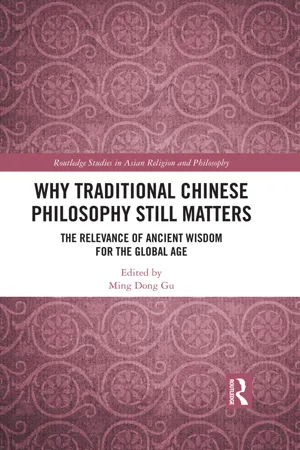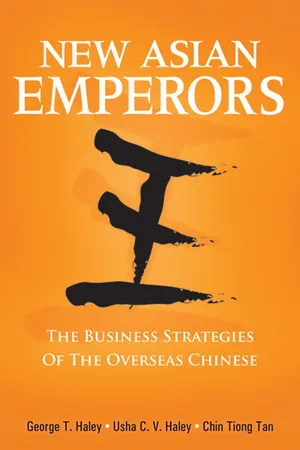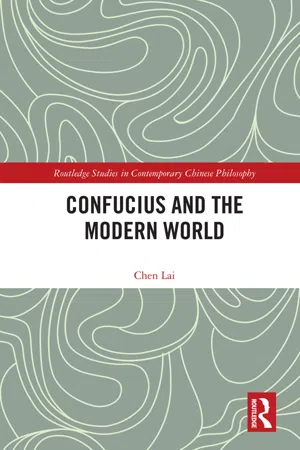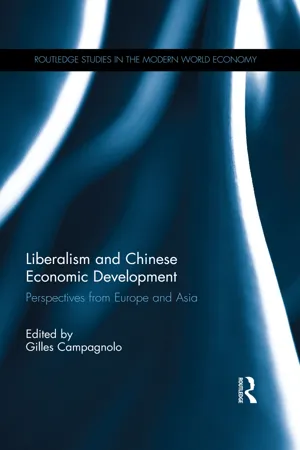History
Confucianism
Confucianism is a philosophical and ethical system based on the teachings of Confucius, a Chinese philosopher who lived during the 6th and 5th centuries BCE. It emphasizes the importance of moral values, social harmony, and the cultivation of virtues such as benevolence, righteousness, and filial piety. Confucianism has had a profound influence on Chinese culture, society, and governance throughout history.
Written by Perlego with AI-assistance
Related key terms
6 Key excerpts on "Confucianism"
- eBook - ePub
Why Traditional Chinese Philosophy Still Matters
The Relevance of Ancient Wisdom for the Global Age
- Ming Dong Gu(Author)
- 2018(Publication Date)
- Routledge(Publisher)
A narrative understanding of Confucianism is made available to us by drawing relevant correlations among specific historical figures and events. Confucianism is importantly biographical and genealogical – the stories of formative models. And in reflecting on the lives of Chinese philosophes – a survey of often passionate, sometimes courageous intellectuals, who as heirs to the tradition of the “scholar-official” (shi 士) advance their own programs of human values and social order – we become immediately aware that any account of the existential, practical, and resolutely historical nature of this tradition makes it more (and certainly less) than what would be defined as “philosophers” doing “philosophy” within the contemporary Western context. We will find that, just as Kant, Bentham, and Mill endeavor to be universalistic, Confucianism is paradigmatically and resolutely particularistic. Thus to search for a universalistic moral principle of some sort in the Confucian writings is to try to square the circle. To seek a principled ground for moral judgments in the classical Chinese texts is, to our minds, like expecting a Kantian to take specific cultural differences into account as conditions that qualify his Categorical Imperative when in fact the Categorical Imperative is the very test for a principle as an unconditional universal law - eBook - ePub
Differences in Identity in Philosophy and Religion
A Cross-Cultural Approach
- Lydia Azadpour, Sarah Flavel, Russell Re Manning(Authors)
- 2020(Publication Date)
- Bloomsbury Academic(Publisher)
6 Confucianism in this understanding is therefore a historically conscious endeavour to continuously revise and re-evaluate the more concrete aspects of its own teachings. In this sense, it engages in a continuous overcoming of itself, which at the same time entails its constant reformation. This approach has direct bearing on interpreting the role of the individual person in Confucianism, and we shall therefore return to this topic in Section ‘Confucian “individualism”’.The daological frameworkWhat role does ontology or cosmology play in our lives? At first, it might seem to be insignificant. After all, the makeup of the world and our status within it are philosophical issues that we do not often raise in everyday conversation. In some parts of the world, however, we often talk about the weather, not only because we are desperately looking for a possible discussion topic but because the weather has such strong impact on our everyday life, the scope of possible activities and our general emotional condition. In other words, the weather affects our emotional well-being in daily life in a most direct and felt manner. But however vague our beliefs may be about our ultimate cosmic status, it would be perfunctory to dismiss the impact of cosmological affairs on our daily lives. With their lack of immediacy, the wider cosmic picture may not be an everyday issue of concern. Nevertheless, while we might not always and even rarely be fully aware of it, the cosmological context provides the deepest ground on which we stand in all our valuations, significant decisions and, indeed, general emotional attitude to life and world. We only need to think of the vast philosophical, religious and existential consequences of the paradigm shift from a geocentric to a heliocentric world view in Western culture during the post-Renaissance period to fathom the extent of the impact of our cosmological world view on the human being’s self-understanding.7Immanuel Kant’s philosophy, for instance, is an attempt to construct a metaphysics consistent with both the then rather new scientific world view emerging from Newton’s theories and the Enlightenment ethical outlook grounded on universal reason. The following passage from Kant’s Critique of Practical Reason - eBook - ePub
- John M. Koller(Author)
- 2018(Publication Date)
- Routledge(Publisher)
The Confucian philosophy outlined so far probably represents primarily the thought of Confucius and his students, although it is extremely difficult to keep separate the various streams of thought contributing to Confucianism. We need to keep in mind that Confucianism has its roots in ancient Chinese thought, some of which came to be recorded in the classics hundreds of years before Confucius was born. It was this ancient thought that Confucius revived and shaped into “Confucianism.” And Confucianism, as a living spiritual tradition, has been dynamic, undergoing continuous change throughout its long history. To attain a perspective from which to understand the main changes, it is important to look at the competing “solutions” to the breakdown of social order and the ancient traditions that were being offered in Confucius’ time.Challenges to Confucian Thought
Collapse of the Chinese Social and Political World
Clearly, in the Spring and Autumn period and the Warring States period (722–221 BCE ), the Chinese people experienced the collapse of their social and political world. In the suffering and chaos that prevailed, thinkers were challenged to find a way to restore social order and meaning to life. Although many solutions were proposed, all of them can be seen to belong to one or the other of three ways, each with its own set of ideas and each at odds with the others.The first way, which included the Daoists, advocated a return to a simpler life, in accord with nature. Civilization itself was the problem, they argued. In order to achieve harmony and live peacefully, the conventions and institutions of society needed to be abandoned or simplified. Government, and even morality, should be abandoned. Then people would be naturally respectful and helpful to each other.The second way was that of the pessimists who had given up hope. According to them, there was no way to restore order and provide for a meaningful life in society. Their recommendation was to withdraw from the world, with each person trying to save themselves. Because times were so bad and the outlook so bleak, although it had little to offer, the pessimistic way was quite popular. - eBook - ePub
New Asian Emperors
The Business Strategies of the Overseas Chinese
- George T. Haley, Usha C. V. Haley, ChinHwee Tan(Authors)
- 2012(Publication Date)
- Wiley(Publisher)
Chinese traditional economics suffocated the goal of wealth creation, which meant displaying desirable goods, valuing rare goods, and in short, allowing greater wealth and concomitant honor to create “contention among the people,” a situation good government sought to prevent. Consequently, Confucian principles and traditional Chinese law forbade merchants from wearing fine clothes outside the home and riding horses or wagons. Merchants had to walk everywhere; thus the mandarins intended to show that merchants were no better than other small or lesser men.The Family
The family is an overwhelming constant in Confucianism. The family dominates the individual’s moral considerations and behavior. The family sets the tone for the individual’s relationship with others whom he meets daily, for the individuals’ relationship with the sovereign or other authority figures outside the family circle, and for the individual’s relationship with society in general. Confucianism offers an immediate and unending perspective on the family: individuals owe responsibility to their nuclear and extended families, especially to their parents, and also to their ancestors. Consequently, the mention of economic sufficiency referred to sufficient income to house, clothe, and feed living family members, and to make appropriate offerings and conduct rituals for dead ancestors.A Confucian’s often paternalistic, management style permeates the ranks of the New Asian Emperors, and fathers often assume the role of professional boss vis-à-vis their children. Ng Teng Fong, Singapore’s biggest private landlord, offers a glimpse into this style. His eldest son, Robert, runs Sino Land, his family’s business in Hong Kong and one of the top developers in the territory. Robert, educated at an English boarding school and in his 50s, lives in an apartment rented from the company; he owns only about US$1 million of Sino Land’s equity. His father telephones every day to check on the cash balances (Studwell, 2007).We have indicated that the duty between a father and son superseded the duty between a man and his sovereign. In Confucian family ethics, a man’s duty to his parents even exceeds his duty to his own person. The obedience and deference a man owes his parents does not end on his gaining maturity; he owes his parents unflinching duty as a child, an adolescent, a grown man in his own dotage, and even after his parents’ death. This highly personal familial loyalty resounds in two chapters in the Analects - eBook - ePub
- Lai Chen(Author)
- 2018(Publication Date)
- Routledge(Publisher)
That this issue was put forward had a direct inheritance relationship with Weber’s study on Protestant ethics and the birth of Western capitalism as well as his study on Chinese religious ethics and China’s modernity. At that time, most scholars held that just as Weber maintained, Confucian ethics and modernity (as rationalization) are irreconcilable by and large. He had some points. First, Confucianism lacked emphasis on individualism and a strong motive to transform society and was too group-oriented. Second, it attached too much importance to education in shaping the perfect personality and lacked the form of aggressive personality which dominated the world. Third, it laid emphasis on experienced wisdom but not experiential and quantitative knowledge. It should be noted that 15 years later these scholars turned the other way around. They interpreted the economic take-off of East Asia and its challenge against the West with these values they used to criticize. 2 Referring to the development of Japan since the 19th century, some US scholars stress that both Chinese and Korean Confucianism stood in the way of modernization of the two countries. Moreover, they hold that the Japanese Confucian tradition contributes to its modernization. The question is why Confucianism can play a role in Japan’s modernization to some extent. Robert Bellah (a brilliant disciple of Talcott Parsons) pointed out in his famous work Tokugawa Religion – Cultural Origins of Modern Japan that Japan’s modernization is attributed to Wang Yangming’s attitude towards life featuring the confluence of philosophy of practice with earnestness and Bushido spirit - eBook - ePub
- Gilles Campagnolo(Author)
- 2016(Publication Date)
- Routledge(Publisher)
Nevertheless, according to Bell, the Confucian representation of property has (at least) two significant limits which keep it far from the perspective of a full market economy (Bell 2003). First, the overriding value of material welfare (mentioned above) encompasses the fact that the state has to control the distribution of land and even its use (Mencius 1984: 3A.3). Second, another constraint falls on property rights. It originates from obligations that individuals have to each other within the family. This second point can be seen as a consequence of the family–property conception, yet it also comes from the very status that Confucianism gives to the family structure. 9 The third aspect of Confucian social ethics in focus here pertains precisely to the importance of the family. In Confucianism, family is crucial insofar as it is the space in which one learns virtue: filial piety is at the core of all concepts of Confucian ethics. Filial piety is defined as gratitude toward parents for nurturing, instructing and loving. As already mentioned, within the family, productive adults have to take care of their family members in need. This duty is even stronger for elderly parents. Filial piety requires more than providing to elderly parents material comfort, it is about serving them, and serving them even if it means sacrificing one’s own interest. In case of conflict, filial piety should have priority over any other duty, as for instance caring of wife and children (Bell 2003: 230), public duties or even the obligation to follow the law (Bell 1995: 23–24). 10 Family is the first school of virtue in Confucianism (chronologically and in terms of importance), because filial piety is the utmost virtue and the source of all other virtues that can be applied in everyday life. Experiencing filial piety leads to learning responsibility and self-sacrificing love, and is “the essential way of learning to be human” (Tu 1989: 13, quoted in Bell 1995: 22)
Learn about this page
Index pages curate the most relevant extracts from our library of academic textbooks. They’ve been created using an in-house natural language model (NLM), each adding context and meaning to key research topics.





